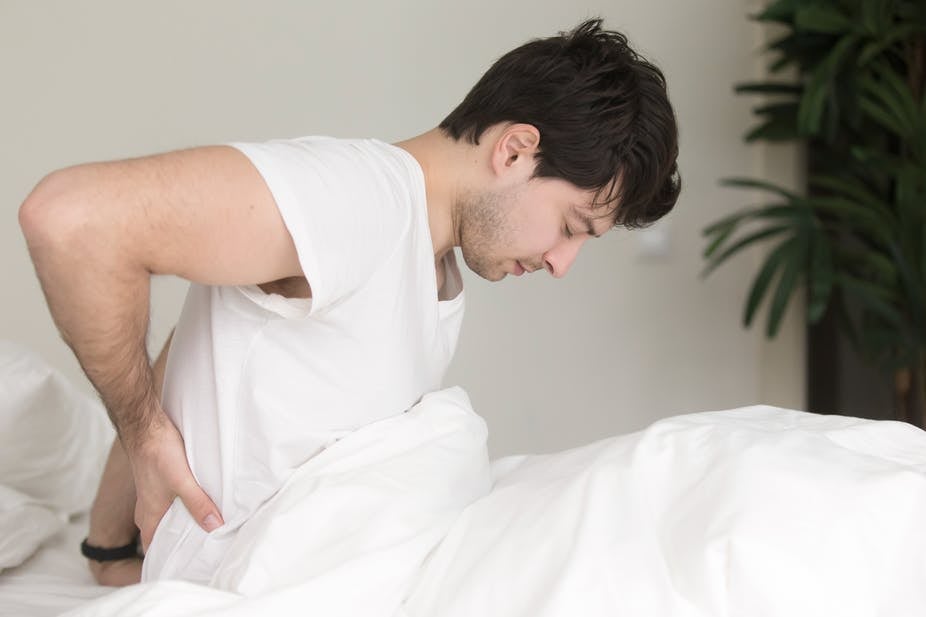Osteopathy can be used to treat mental health issues related to back pain, study finds
OMT can reduce anxiety and improve self-care too

Your support helps us to tell the story
From reproductive rights to climate change to Big Tech, The Independent is on the ground when the story is developing. Whether it's investigating the financials of Elon Musk's pro-Trump PAC or producing our latest documentary, 'The A Word', which shines a light on the American women fighting for reproductive rights, we know how important it is to parse out the facts from the messaging.
At such a critical moment in US history, we need reporters on the ground. Your donation allows us to keep sending journalists to speak to both sides of the story.
The Independent is trusted by Americans across the entire political spectrum. And unlike many other quality news outlets, we choose not to lock Americans out of our reporting and analysis with paywalls. We believe quality journalism should be available to everyone, paid for by those who can afford it.
Your support makes all the difference.Millions worldwide suffer from chronic musculoskeletal back pain (lasting more than three months). The problem is so big that in the UK alone, it is estimated that 116 million days of work are lost, a million hospital appointments are made and five million GP visits are scheduled – just for low back pain.
The physical agony is often not a standalone problem, however. Thirty-five per cent of people who suffer with low back pain are also diagnosed with depression, anxiety and social isolation.
Guidelines by the National Institute for Health and Care Excellence suggest that chronic back pain sufferers should have physical therapy as part of a broader package of treatment which includes psychological help. But we have been exploring how one single type of osteopathic treatment can be used to treat both the physical and mental conditions.
Osteopathic manipulative therapy is a drug-free medical approach which uses touch-based massage, manipulation of soft tissue and joints, and spine mobilisation procedures, to diagnose and treat pain related conditions. Practitioners use a structured evaluation to identify dysfunction relating to the skull, spine, pelvis and abdomen, as well as upper and lower limbs, and target treatment.
OMT has already been found to be effective for several types of musculoskeletal pain, such as chronic neck pain. In addition, it has been proven to be more effective than the standard primary care options – such as exercise and painkillers – at improving quality of life for those with persistent low back pain three and 12 months into treatment.
Researchers have also shown that OMT can reduce subacute (between acute and chronic) low back pain. Accordingly, spinal mobilisation and manipulation alone have been found to be effective for acute, subacute and chronic low back pain.
While this is all very positive, there is a pattern here. The limited OMT research has focused mostly on physical problems, not the associated mental health issues.
Treating mental health issues
To find out more about how osteopathy could potentially affect mental health, at our university health and wellbeing academy in Swansea, we have recently conducted one of the first studies on the psychological impact of OMT – with positive results.
For the past five years, therapists at the academy have been using OMT to treat members of the public who suffer from a variety of musculoskeletal disorders which have led to chronic pain. To find out more about the mental health impacts of the treatment, we looked at three points in time – before OMT treatment, after the first week of treatment, and after the second week of treatment – and asked patients how they felt using mental health questionnaires.

This data has shown that OMT is effective for reducing anxiety and psychological distress, as well as improving patient self-care. But it may not be suitable for all mental illnesses associated with chronic pain. For instance, we found that OMT was less effective for depression and fear avoidance.
All is not lost, though. Our results also suggested that the positive psychological effects of OMT could be further optimised by combining it with therapy approaches like acceptance and commitment therapy (ACT). Some research indicates that psychological problems such as anxiety and depression are associated with inflexibility, and lead to experiential avoidance. ACT has a positive effect at reducing experiential avoidance, so may be useful with reducing the fear avoidance and depression (which OMT did not significantly reduce).
Other researchers have also suggested that this combined approach may be useful for some subgroups receiving OMT where they may accept this treatment. And, further backing this idea up, there has already been at least one pilot clinical trial and a feasibility study which have used ACT and OMT with some success.
Looking to build on our positive results, we have now begun to develop our ACT treatment in the academy, to be combined with the osteopathic therapy already on offer. Though there will be a different range of options, one of these ACT therapies is psychoeducational in nature. It does not require an active therapist to work with the patient, and can be delivered through internet instruction videos and homework exercises, for example.
Looking to the future, this kind of low cost, broad healthcare could not only save the health service money if rolled out nationwide but would also mean that patients only have to undergo one treatment.
Darren J Edwards is a senior lecturer in health and wellbeing at Swansea University. This article was first published in The Conversation (theconversation.com)
Join our commenting forum
Join thought-provoking conversations, follow other Independent readers and see their replies
Comments